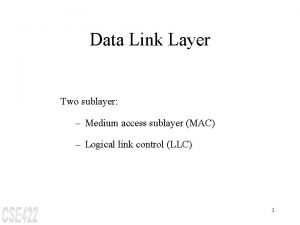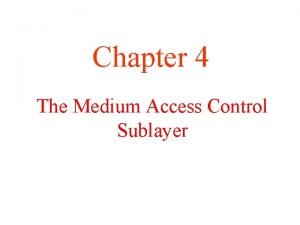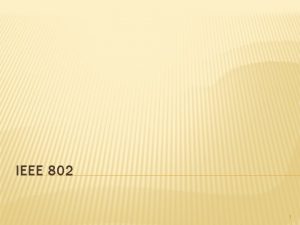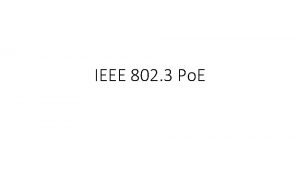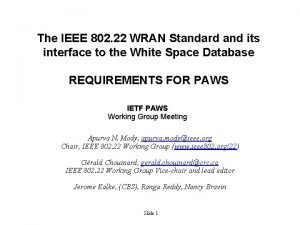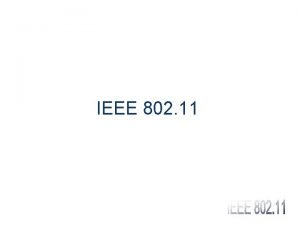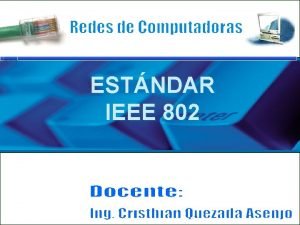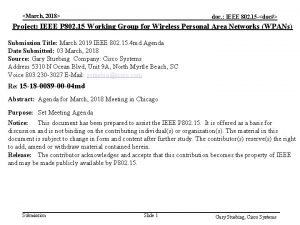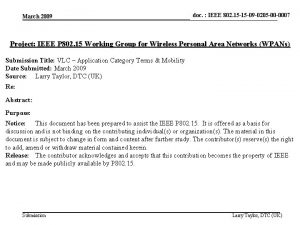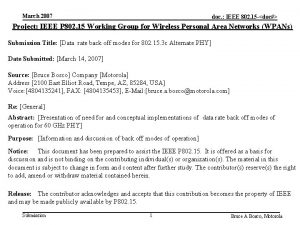March 2019 doc IEEE 802 11 190439 r






- Slides: 6

March 2019 doc. : IEEE 802. 11 -19/0439 r 0 Proposed TIG on randomized and changing MAC addresses Date: 2019 -03 -11 Authors: Submission Slide 1 Mark Hamilton, Ruckus/ARRIS

March 2019 doc. : IEEE 802. 11 -19/0439 r 0 Abstract Proposal for a Technical Interest Group (TIG), to do first analysis of impacts of randomized MAC addresses on features and facilities of 802. 11, and determine if next steps are needed or desired. Submission Slide 2 Mark Hamilton, Ruckus/ARRIS

March 2019 doc. : IEEE 802. 11 -19/0439 r 0 Random and changing MAC addresses - Current status • Randomizing a device’s MAC address to anonymize users from “sniffing” is generally agreed as desirable for privacy • Most major mobile/portable operating systems are already deployed with some form of MAC address randomization capability, and periodic/frequent address changes, with: • Varying approaches to opt-in/opt-out/default behaviors • Varying conditions for use of random address and frequency of changes – pre-association or while associated • It is likely that randomization will see more use/deployment in the near future (based on disclosed plans, and rumors) • 802. 11 aq amendment codified some uses • Both pre-association use, and description of behavior required for use during or across associations Submission Slide 3 Mark Hamilton, Ruckus/ARRIS

March 2019 doc. : IEEE 802. 11 -19/0439 r 0 Random and changing MAC addresses - Impacts Randomized and changing addresses can/are having effects on upper-layer objectives: • Disrupts networks using MAC address to identify users (which is now explicitly not recommended) • Trade-off of user desire for individualized treatment versus their desire for privacy • Disrupts networks from tracking users by MAC address (also now explicitly not recommended) • Businesses use MAC address to track foot traffic for their own value, value to users is indirect The above, and other similar impacts, can be addressed with higher-layer solutions for user identification, without loss of privacy. (Recommended – See WBA liaison exchange, 11 -18/1988 r 2. ) Submission Slide 4 Mark Hamilton, Ruckus/ARRIS

March 2019 doc. : IEEE 802. 11 -19/0439 r 0 Random and changing MAC addresses – Impacts 2 But, randomized and changing addresses can also affect purposes within layer 2: • Potentially disrupts networks’ layer-2 tracking and steering, through lack of understanding multiple device appearances are actually the same device in different contexts • Disrupts analytics and troubleshooting, through lack of correlation of actions/events to the same device These result in direct impact on network management and operation, which in turn affects user experience. It is valuable to investigate these impacts, and possible mitigations Submission Slide 5 Mark Hamilton, Ruckus/ARRIS

March 2019 doc. : IEEE 802. 11 -19/0439 r 0 RCMA TIG Formation motion “Approve formation of a randomized and changing MAC address randomization (RCMA) TIG to investigate the: • current and planned implementations of random and changing MAC addresses in devices, and current and planned 802. 11/802 Standards treatment of randomized MAC addresses • impact on 802. 11 features from randomized MAC addresses and/or changing addresses during: • Pre-association (stateless) • Preparing for (creating shared state) and during associations • potential mechanisms to address the above impacts, through: • Implementation options, or possible guidelines document • Modifications to the Standard, if any, and recommend continuing work (Study Group/PAR) The TIG is to complete a report on this topic at or before the November 2019 session. ” Submission Slide 6 Mark Hamilton, Ruckus/ARRIS
